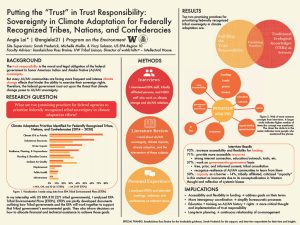Putting the “Trust” in Trust Responsibility: Sovereignty and Climate Adaptation for Federally Recognized Tribes, Nations, and Confederacies
Many American Indian and Alaska Native (AI/AN) communities in this region are experiencing negative impacts of climate change, like extreme weather events, that result in displacement and threats to infrastructure and public health. This affects the ability of AI/AN communities to exercise their sovereignty, and the federal government has a moral and legal responsibility to address threats to AI/AN sovereign rights. The aim of this study was to determine what promising practices federal agencies can take to prioritize federally recognized Tribal sovereignty in climate adaptation. My internship with EPA Region 10 involved analyzing and visualizing data for EPA Tribal Environmental Plans (ETEPs). ETEPs are co-created documents that describe Tribal governments’ environmental concerns to inform EPA’s decisions on how to allocate financial and technical assistance to address those concerns. I also conducted interviews with EPA staff, tribally affiliated persons, and NGO staff who work on climate change and AI/AN relations on their perspectives regarding federally recognized Tribal sovereignty in the context of their work. Lastly, I reviewed scholarly literature on AI/AN sovereignty, climate impacts, climate adaption, collaboration, and the intersection of these subjects. Promising practices to prioritize federally recognized Tribal sovereignty include upholding the trust responsibility through respectful consultation and adequate technical and financial assistance. Additionally, federal agencies should recognize and value Traditional Ecological Knowledges as science while applying them respectfully and legally. Following these promising practices would help affirm AI/AN sovereignty and give the federal government the opportunity to demonstrate its commitment to environmental justice.
